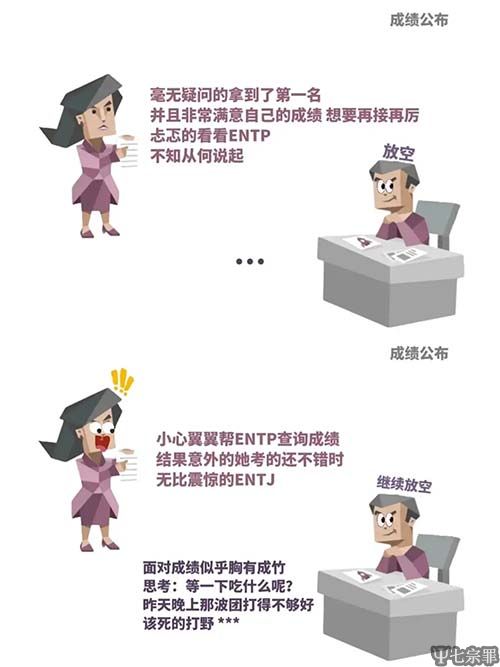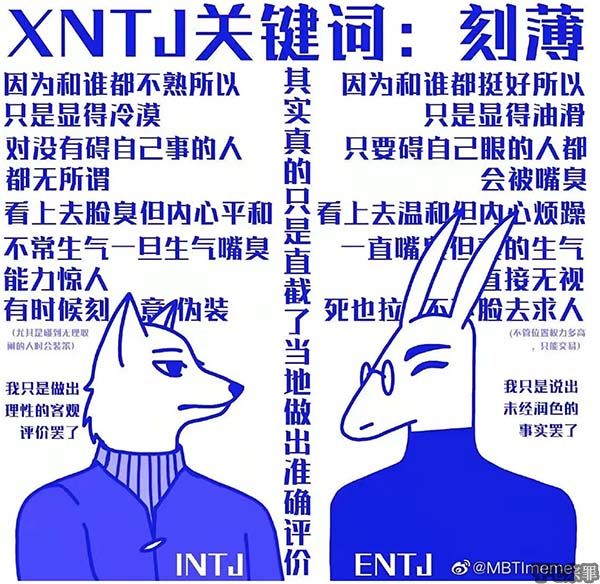ISFP Personality Type
ISFP人格型
The ISFP personality type is one of sixteen types. ISFPs comprise about 8-9% of the general population, making them one of the more commonly encountered types.
ISFP是16种人格型之一,约占总人口的8-9%,是一种比较常见的人格型。

ISFPs are lovers, nurturers, and caregivers. They experience great joy from spending time and making memories with their friends and loved ones. Like the INFP, they have a particular fondness for children and animals, as their dominant function, Introverted Feeling (Fi), is drawn to those incapable of helping themselves.
ISFP是好的爱人、养育者和照顾者,他们非常享受与朋友、爱人一起度过美好时光并创造共同回忆。和INFP一样,ISFP也特别喜爱孩子和小动物,因为他们的主导功能——内向情感(Fi)就是会不自觉地关心那些“生活无法自理”的人。
ISFPs form deep emotional attachments to their loved ones, contributing to a strong sense of loyalty and devotion. ISFPs are generally less focused on the well-being of the masses (a concern of Fe and/or Intuitive types) than they are with applying their Fi in more local and concrete ways.
ISFP往往对他们爱的人有很深的情感依恋,从而建立起虔诚地奉献感与忠诚感。但ISFP不太关注抽象的“全人类的福祉”(这往往是Fe型人格or直觉型人格更关注的),ISFP的Fi(内向情感)会着眼在一些更具体、更切身的事物上。
Both INFPs and ISFPs are sensitive to injustices and dehumanization (Fi). While perceived injustices may motivate INFPs to write poetry or novels (Fi-Ne), ISFPs are more apt to respond with action and hands-on aid (Se). An ISFP friend of mine, for instance, works in inner-city Berkeley providing food and other goods to the homeless.
INFP和ISFP都是对“不公正”和“不人道”非常敏感的人格型(因为主导功能都是Fi)。当INFP感受到“不公正”时,可能会受此激发写出诗作或小说(Fi-Ne),但ISFP则更倾向于用实际行动或援助来回应(Se)。例如,我的一个ISFP朋友就在伯克利市中心工作,为无家可归的人提供食物和用品。
Like the ESFP, ISFPs often display a high concern for, as well as good taste in, fashion and aesthetics. They are often physically attractive, well manicured, and enjoy keeping up their appearance. INFPs, by contrast, are often well-described as “earthy” and are far less concerned with enhancing, embellishing, or carefully attending to their physical presentation. Therefore, ISFPs and INFPs can often be distinguished rather quickly by mere observation of their physical presentation.
和ESFP一样,ISFP也通常会表现出对“时尚”和“审美”的高度关注与优秀品味,他们往往是外表迷人、精心装扮的,同时也非常乐于保持靓丽的仪表。相比之下,INFP就要“朴实”得多,他们很少注意、修饰、或强化自己的外在。因此,通常情况下,我们通过外貌特征就可以很快地将ISFP和INFP区分开来。
Like the ISTP, ISFPs commonly display impressive kinesthetic intelligence. They are often athletic and endowed with good dexterity and hand-eye coordination. In contrast to INFPs, who exhibit high levels of mental energy, ISFPs possess more physical energy and stamina. While INFPs use their Ne to explore and manufacture new ideas, ISFPs employ their hands, body, and other senses to explore and manipulate the physical world (Se).
和ISTP一样,ISFP也通常有惊人的运动(肢体)天赋,他们往往是运动健将,具有极高的肢体灵活性和协调能力。与拥有极高精神能量的INFP相比,ISFP拥有更高的体力和耐力,当INFP用他们的Ne功能来探索世界、创新想法时,ISFP则用他们的双手、身体和其他的感官来摸索和应对现实世界(Se)。
Like other IP types, ISFPs are quite independent and self-motivated. Their sense of values (Fi), as well as their desire to excel performance-wise (Se), can motivate them to diligently and seriously apply themselves. However, because of their preference for hands-on activities, some may underperform in academic settings. As is true of other Sensing types, being forced to deal in abstractions for too long can be draining for ISFPs.
和其他I-P型人格一样,ISFP也是非常独立与自我激励的人格。他们内在的价值判断(Fi)和想要出类拔萃的愿望(Se)会激励自己认真地投入工作。然而,由于他们对实践类活动有强烈的偏好,一些ISFP可能会在学业成绩上表现不太好。和其他的S型人格一样,如果ISFP被迫长时间地处理一些抽象命题,将会消耗他们巨大的能量。
ISFPs often seem more optimistic and easily satisfied with life than INFPs. INFPs frequently have a depressive or melancholic bent, struggling to make it in a world that seems indifferent to the “impractical” (N) gifts they have to offer. ISFPs, by contrast, seem to more easily assimilate themselves to conventional careers and lifestyles.
ISFP通常比INFP更乐观,也更容易对生活感到满足。INFP型人格往往有抑郁或忧郁的倾向——他们努力地在现实生活中挣扎,但这个现实的世界却似乎对他们那些不切实际的“N的理想”毫不关心,与此相反,ISFP就毕竟能融入到传统的职业和生活方式中。
ISFP Personality Development & “Functional Stack”
ISFP的人格发展与功能类型
ISFPs’ Functional Stack:
ISFP的功能类型:
Dominant function: Introverted Feeling (Fi)——内向情感(Fi)
Auxiliary function: Extraverted Sensing (Se)——外向感觉(Se)
Tertiary function: Introverted Intuition (Ni)——内向直觉(Ni)
Inferior function: Extraverted Thinking (Te)——外向思考(Te)
ISFPs’ personality type development can be broadly conceived as consisting of three phases:
ISFP的人格发展可以大致分为三个阶段:
Phase I (Youth-20s)
阶段一(少儿期-20S)
This phase of development is characterized by the emergence of Introverted Feeling (Fi) as ISFPs’ dominant personality function. Phase I ISFPs are quick to make Fi judgments, even if keeping most of their opinions and sentiments to themselves. ISFPs are also prone to viewing things in terms of black and white in this phase of their type development.
阶段一主要是发展和培养ISFP的主导功能——内向情感(Fi)。处于阶段一的ISFP能够迅速地做出Fi的判断——尽管他们可能将大部分的观点和情绪都藏在了心底。这一阶段的ISFP也倾向于用非黑即白的方式看问题。
Phase II (Late Teens-30s)
阶段二(青春期末-30S)
While the inferior function is not entirely dormant or inert in Phase I, the epic tug-of-war between the dominant and inferior does not come to the fore until Phase II. Once ISFPs’ dominant Fi reaches a certain threshold of strength and dominance, their inferior function, Extraverted Thinking (Te), begins to assert itself and play a more significant role. This can be somewhat confusing since Te is not next in line in ISFPs’ functional stack, but can be understood as deriving from its bipolar relationship with their dominant Fi.
尽管在人格发展的第一阶段,ISFP的第四功能也并不完全处于休眠状态,但第四功能与主导功能之间的拉锯战还是直到人格发展的第二阶段才开始出现。随着ISFP的主导功能Fi(内向情感)发展到一定的强度和支配地位,第四功能Te(外向思考)就会开始进入ISFP的视线,并逐渐扮演起更有影响力的角色,这可能会让人困惑,因为在功能排序中,第四功能Te并不是下一个就首当其冲待开发的功能,第四功能Te的巨大影响可以理解为其与主导功能Fi之间的冲突与角力。
Phase II ISFPs also show increasing use and development of their auxiliary function, Extraverted Sensing (Se). Their Se compels them to seek out new sensations, interests, and experiences. As a Perceiving function, it also facilitates an opening of their Fi judgments to see if they pass the test of lived experience. Phase II ISFPs may also begin to tap into their tertiary function, Introverted Intuition (Ni). Ni can subconsciously assist ISFPs in piecing together their Se experiences into a clearer and more coherent worldview.
第二阶段也表现为ISFP会越来越多地开发和使用他们的辅助功能——Se(外向感觉),Se功能的开发会促进ISFP去寻找新的感觉、兴趣和体验。而作为感知型功能,Se也会帮助主导功能Fi的判断更加开放——让Fi的价值判断经过具体生活实践的检验。第二阶段的ISFP也可能开始开发他们的第三功能——内向直觉(Ni),Ni功能可以无意识地帮助ISFP将Se的生活体验整合为一个更清晰、更连贯的世界观。
Phase III (30s, 40s, & Beyond)
阶段三(30s,40s,及以后)
If all goes well and they are fortunate enough to enter Phase III, ISFPs become increasingly aware of the insidious ways of their inferior Te. As they become more aware of their inferior and learn to function more authentically as ISFPs, they can experience greater balance between their Fi and Te, as well as a long-awaited sense of peace and wholeness.
如果一切顺利并幸运地进入到人格发展的第三阶段,ISFP会越来越能知觉到他们第四功能Te的隐秘存在感,而随着对Te的知觉,他们会越来越像一个成熟的ISFP那样健康地使用各项功能,他们会在Fi和Te之间感受到更好的平衡,也越来越感觉到人生的安宁感与完整性。
ISFPs’ Dominant Function: Introverted Feeling (Fi)
ISFP的主导功能:内向情感(Fi)
ISFPs’ dominant function is Introverted Feeling (Fi). Compared with Extraverted Feeling (Fe), Fi is more intensive, individualized, and idiosyncratic. Since Fi judgments are formed independent of collective sentiments, ISFPs may be wary of Fe judgments and expressions, which, from an Fi perspective, may seem generic, fake, or contrived.
ISFP的主导功能是内向情感(Fi)。与外向情感(Fe)相比,Fi的情感更为集中、更私人、也更加区别对待。Fi的情感判断是独立于集体情感而形成的,因此ISFP往往会对Fe的情感判断和表达方式持谨慎态度,因为从Fi的角度来看,Fe似乎太泛化、显得虚情假意、勉强做作。
Rightly or not, Fi is commonly perceived as more emotionally “mature” than Fe. For ISFPs, as well as other FP types, emotions are not readily expressed or dramatized. Instead, they are typically managed internally or repackaged and expressed via Extraverted Thinking (Te). Consequently, ISFPs are outwardly measured and rational in their presentation; outsiders may even mistake them for Thinking types.
无论正确与否,Fi通常被认为在情感上比Fe更“成熟”。对于ISFP或其他FP型人格来说,他们的情绪往往不容易表达或者太过于戏剧化,因此反而要在内部重新整理或打包,再通过外向思考(Te)的功能表达出来。于是在外人看来,ISFP反而是慎重而理性的,甚至可能会被误认为是T型(思考型)人格。
The same introverted property which provides emotional restraint is also responsible for the depth and intensity of Fi. At times, one might glimpse such intensity of emotion passing through ISFPs’ Te in the form of biting or caustic remarks.
Fi的内向特质决定了它在情感上的克制与集中,同时也决定了Fi的深度和强度。有时人们可以通过ISFP的Te表达来感受他们在情感上的强烈程度——当他们用Te进行尖锐而刻薄的指责时。
Since Fi is a Judging function, it is characteristically more serious than it is light and playful. It is therefore unsurprising that ISFPs often take themselves and their lives quite seriously. In this respect, they differ from ESFPs, whose dominant function (Se) is more fun-loving and excitement-seeking. While both types utilize Se and Fi, ESFPs’ are primarily geared to absorb, experience, and respond to the world (Se), whereas ISFPs are more intentional in their approach. Finding it difficult to relax and do nothing, ISFPs excel at constantly busying themselves with tasks and other matters.
由于Fi是一种判断型功能,比起轻松或好玩,它要更严肃一些,这也是为什么通常ISFP对待自己的生活也会比较严肃。在这方面,ISFP明显不同于ESFP——ESFP的主导功能(Se)更追求刺激与享乐。虽然这两种人格型都使用Se和Fi功能,但ESFP主要着眼于理解、体验和响应外部世界(Se),而ISFP的这一过程则更有目的性,ISFP很难什么都不做地完全放松,他们常常会让自己忙碌于各项事务之中。
ISFPs’ Auxiliary Function: Extraverted Sensing (Se)
ISFP的辅助功能:外向感觉(Se)
Extraverted Sensing (Se) serves as ISFPs’ auxiliary function. It attunes to concrete sensory details of the external world by way of the five senses (i.e., sight, smell, touch, sound, and taste). Se types can often be found scanning the environment for interesting sensory novelties, noticing details other types might miss. They often display a strong visual recall, or what is sometimes dubbed a “photographic” memory.
ISFP的辅助功能是外向感觉(Se)——它通过具体的五官五感(视觉、嗅觉、触觉、听觉和味觉)去收集现实世界的信息。Se型人格往往能在外界环境中发现新奇有趣的事物,留意到很多其他人可能会忽略的细节。他们通常拥有出众的视觉记忆力,或者说“过目不忘”的能力。
Se differs from Ne in that it is not a highly verbal function. While INFPs enjoy discussing ideas, ISFPs often prefer to be “doing” something. While INFPs love playing with words or abstractions, ISFPs may get swept up in sports, performance, cooking, etc. Despite these abstract versus concrete differences, both ISFPs and INFPs are commonly considered “artistic.” Unlike IJs, who outwardly express Judging (Fe or Te), IPs extravert their Perceiving function (Se or Ne). This can lead IPs to appear more creative or artistic. With regard to creative expression, INFPs are inclined toward writing or poetry, while ISFPs are often better suited for painting, sculpting, or various types of performance.
与Ne不同,Se不是一种高度语言性功能,因此当INFP热衷于讨论想法时,ISFP却更喜欢实实在在地去“做”事情,INFP喜欢玩文字或抽象的东西,而ISFP则更容易喜欢上运动、表演或烹饪。尽管有抽象VS具体的差别,但总体来说ISFP和INFP都被认为是具有“艺术家气质的”。与I-J型人格相比,由于I-J的对外表达功能是判断型功能(Fe或Te),而I-P对外表达功能是感知型功能(Se或Ne),这使得I-P更具有创造力和艺术性。在“具有创造力的表达”上,INFP倾向于创作诗歌或小说,而ISFP则倾向于绘画、雕塑或各种形式的表演。
Especially in F types, Se contributes to a strong concern for taste, aesthetics, and fashion. As mentioned earlier, ISFPs are more concerned with their appearance and more liberal users of make-up or other embellishments than INFPs (who use Si) tend to be. Not only is Se associated with taste, but because it is extraverted, it gravitates toward popular tastes and fashions. This creates an interesting dynamic in ISFPs. On the one hand, their Fi is highly individualized, concerned with making its own value judgments and developing its own tastes. On the other hand, their Se encourages them to notice what everyone else is doing and to follow suit. Because Fi is dominant, however, we would expect it to win out most of the time.
Se功能着眼于对品味、美学和时尚的强烈关注,尤其在F型人格中表现明显。如前文提到的,ISFP要比INFP(使用Si功能)更关注自己的外表,也更多地使用化妆品和装饰物,这不仅仅是因为Se功能与品味有关,也因为它是外向型功能,更容易被流行品味与时尚潮流所吸引。这就导致了一个有趣的现象:一方面,ISFP的Fi高度私人化的,注重于自我价值判断和发展出独有的品味;另一方面,Se功能又会让ISFP留意到其他人在做什么并效仿他们。当然,对于ISFP来说,由于Fi为主导功能,因此大多数情况下Fi还是会战胜Se。
The Fi-Se combination may also inspire ISFPs to develop refined tastes for food or drink. Many enjoy cooking, wine tasting, and sampling new cuisines and restaurants. Contrast this with INFPs, whose Ne-Si combination inspires a more basic diet, often centered on organic or whole foods.
Fi-Se的功能组合还可能会激发出ISFP对饮食的精细品味,许多ISFP会爱上烹饪、品酒或去尝试各种新的餐厅与菜系。相比之下,INFP的Ne-Si组合就比较偏好简单基础的饮食习惯,通常以天然有机食品为主。
Se can also be associated with broad interests in sports or other “hands-on” activities. It may compel ISFPs to take up work as chefs, artisans, dancers, musicians, physical and occupational therapists, and the like.
Se功能还与广泛的运动兴趣或其他实践类活动有关,它可能会让ISFP选择厨师、工匠、舞者、音乐家、理疗师等职业。
ISFPs’ Tertiary Function: Introverted Intuition (Ni)
ISFP的第三功能:内向直觉(Ni)
Like ISTPs, ISFPs use Introverted Intuition (Ni) as their tertiary function, which may lead them to develop some degree of interest in abstract or theoretical topics. After all, Ni and Fi are the two introverted functions employed by INTJs, who are among the most theoretically-minded of all types. However, because ISFPs’ Ni is tertiary rather than dominant, it is far less accessible for conscious intuitive perception. So like other SP types, ISFPs gain most of their insights through lived experience rather than through bursts of intuitive knowing.
与ISTP一样,ISFP的第三功能为内向直觉(Ni),这让他们对一些抽象命题也能发展出一定的兴趣。毕竟Ni和Fi正是INTJ所使用的两种内向型功能,而INTJ又是最具理论头脑的人格型。但是,由于ISFP的Ni仅是第三功能,不是主导功能,所以比起真正深层次的直觉感知还是差得远。就如其他SP型人格一样,ISFP大部分的洞察都是通过生活阅历获得的,而不来源于直觉性的认知。
ISFPs’ Inferior Function: Extraverted Thinking (Te)
ISFP的第四功能:外向思考(Te)
As is true of other types, ISFPs can be easily blinded to the degree to which their inferior function impacts their decisions and behavior. Without sufficient awareness and integration of their inferior, ISFPs will continue to feel incomplete and be prone to unwise decision-making in their careers and relationships. Therefore, ISFPs must work to understand the ways in which their inferior function, Extraverted Thinking (Te), manifests in their personality.
和其他人格型一样,ISFP也容易忽视掉他们的第四功能——外向思考(Te),直到这已经影响到他们的行为和决策。如果没有足够意识并发展他们的第四功能, ISFP将会在职业选择和人际关系中做出不明智的选择。因此,ISFP很有必要了解他们的第四功能——外向思考(Te)在其人格特征上的表现。
For both ISFPs and INFPs, the Fi-Te function pair involves a tension between individuality and subjectivity (Fi), on the one hand, and standardized ways of doing things (Te), on the other. Consciously, ISFPs tend to emphasize the former, championing the unique values and preferences of the individual (Fi). Unconsciously, however, they are drawn to “objective” truths and more standardized ways of doing things (Te).
对于ISFP和INFP来说,Fi-Te的功能组合常常会使他们面对Fi与Te之间的拉扯张力,Fi注重个人的主体性,强调个人的独特价值和私人偏好;但同时,ISFP又会不知不觉地被Te那种“客观事实”和“规范化的行事作风”所吸引。
Since all Introverts’ inferior function is extraverted in direction, it is sensitive to externalities. For ISFPs, their inferior Te is attuned to the structure of external systems, systems that are inextricably linked with Fi-related concerns such as hunger, homelessness, or other injustices. This is one of the chief ways their Te works with their Fi. Their Te draws conclusions about external circumstances and their Fi provides the subjective response to those Te judgments. The world relies on ISFPs (and INFPs) to use this Te-Fi process to identify potential injustices and to ensure that the individual (Fi) doesn’t get lost in the system (Te).
由于所有内向型人格的第四功能都是外向型功能,所以往往对外部性很敏感。对于ISFP来说,他们第四功能Te对外在环境的关注,往往与其“内在Fi的关注点”有密不可分的联系——比如对饥荒、无家可归人群、不公正等问题的关注。这是他们Te与Fi合作的主要方式之一,使用Te对外部环境的状况做结论,再用Fi对这些Te的判断给出主观反应。这个世界需要ISFP(和INFP)的Te-Fi过程去识别潜在的不公正现象,也需要Te-Fi来确保个体的个性(Fi)不会泯灭在统一的体系之中(Te)。
ISFPs’ Te can also contribute a desire to organize the immediate environment. Like INFPs, ISFPs can derive a great deal of guilty pleasure from ordering and organizing, giving their Te the sense of external control it desires.
ISFP的Te功能还可能会有组织协调外在环境的愿望,就像INFP一样,ISFP也能从组织和命令中获得很多私密的快感——这给予了他们Te所希望的外部控制感。
Te may also inspire ISFPs to “follow the rules” and “be responsible.” ISFPs who regularly indulge their Te may be so bent on being pious or responsible that they fail to spend sufficient time exploring and experiencing life (Se). And because responsibility is culturally endorsed as a positive virtue, they may fail to realize that being obsessed with it is actually quite unhealthy for them, forfeiting their openness to new experiences and potentially some degree of compassion (Fi). In the grip of Te, ISFPs can become rigid, particular, and dogmatic, appearing more like ESTJs than ISFPs.
Te功能还会鼓励ISFP“遵守规则”、“负起责任”,那些Te功能较强的ISFP很可能会因此太过尽职尽责,以至于没有足够的时间去探索和体验新鲜的生活(Se),而通常来说“负责任”又被广泛地认为是一种正面的美德,这就可能会让ISFP无法意识到,其实过于沉迷责任感中对他们来说是非常不健康的,这会让他们丧失对新鲜体验的开放性,并有可能丧失一定程度的同情心(Fi)。在Te的控制下,ISFP可能会变得教条而死板,看起来更像一个ESTJ而不是ISFP。
ISFPs feel they have little control over the outside world. Like other IPs, ISFPs are known for their lack of assertiveness and conflict avoidance. This is partly due to their Fi’s desire to avoid hurting others’ feelings. It also relates to the fact that being “assertive” involves extraverted Judging, which for ISFPs, is in the inferior position (Te). So when it comes to expressing their judgments, they often avoid doing so directly. Instead, they may simply swallow the judgment and try to deal with its attendant feelings by way of their Fi. Or, they may address the issue more obliquely through action (Se). Like other P-types, ISFPs can be disposed to expressing their grievances through passive-aggressive behavior.
ISFP常常觉得他们几乎无法控制外部世界,和其他I-P型人格一样,ISFP也以缺乏果敢与避免冲突而著称,这一方面是因为他们的Fi不愿意伤害别人的感情,另一方面也是因为“坚定地表达”需要外向的判断功能,而ISFP的外向判断功能Te是第四功能,因此ISFP往往会避免直接对外表达自己的判断,相反,他们可能更愿意去接受别人的判断,再用他们的Fi来处理对这些判断的感觉,或者,用实际的行动去面对(Se)。和其他P型人格一样,ISFP也倾向于用消极攻击行为来表达自己的不满。
For ISFPs, personal growth requires regular employment of their dominant Fi and auxiliary Se. It involves avoiding obsessing over Te responsibilities and, instead, building a life based on care and empathy (Fi), as well as a breadth of activities (Se). Those who do so successfully are more open, flexible, and balanced, capable of avoiding the traps and pitfalls of the inferior function.
对ISFP来说,个人的成长需要规律地使用他们的主导功能Fi和辅助功能Se,避免过度地沉迷于Te的责任感中,建立起一个基于同理心与关怀感(Fi),同时广泛涉猎各项活动(Se)的生活模式。能够做到这些的ISFP将更加开放、灵活,获得生活的平衡,同时避免次级功能产生的陷阱。
 七宗罪心理
七宗罪心理













